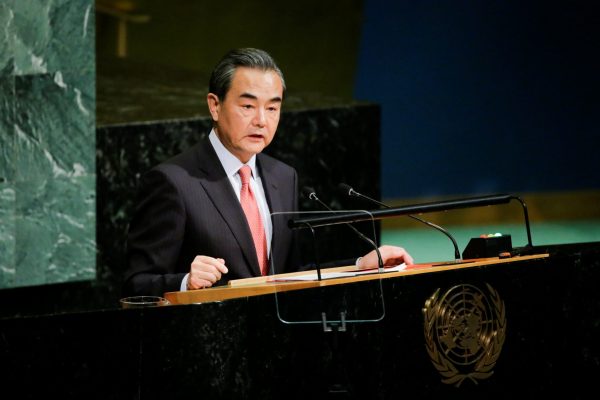Some believe that China seeks to change this order in fundamental ways. Amitav Acharya, for example, writes that ‘it is a fallacy to assume that just because China, India and other rising powers have benefitted from the liberal hegemonic order, they will abide by its norms and institutions. They may not seek to overthrow it but [may] push for changes that might significantly alter the rules and institutions of that order’.
But China’s relationship to the liberal international order is essentially the same as that of other major states. This is because in most respects this order serves Chinese interests. China has joined the agreements and institutions that make up this order and complies about as much as other major states do. It seeks to influence this order — but not to overthrow or fundamentally alter it.
A variety of theories have been proposed for what drives China’s foreign policy. One set of theories sees China promoting a particular ideology or vision of the international system and its role within it, such as the principle of sovereignty, a multi-polar world, Asian values or Chinese domination. Alternatively, China’s policies can be seen as pragmatic responses to specific national interests, such as protecting its material welfare, enhancing its influence and diminishing the influence of rival powers like the United States. A review of selected international regimes supports the view that China’s negotiating positions are interest-based rather than outright revolutionary.
In regional trade negotiations, China favours further opening world markets to manufactured exports. When the Trans-Pacific Partnership (TPP) was being negotiated, China showed an interest in it but no desire to join — presumably because the TPP framework imposed environmental and labour conditions that Chinese policymakers viewed as unfavourable. It has instead worked to join or create other bilateral and regional free trade agreements, such as the China–ASEAN Free Trade Area and the Regional Comprehensive Economic Partnership, which set lower standards than the TPP on environmental and social protections.
China’s participation in the existing arms control and disarmament regime also supports the strategic status quo. China backs opposition to North Korean and Iranian nuclear weapons development and proliferation and it supports the further development of the arms control regime. Yet China supports the declaration of nuclear-free zones — which the United States, as the dominant nuclear power, does not. China similarly supports bans on first use of nuclear weapons, the development of anti-ballistic missiles and arms races in outer space — all areas in which the United States enjoys advantages.
In short, China is a supporter of the arms control and disarmament regime, but like other countries it pursues its own interests with respect to how that regime is applied and developed.
Over the past quarter century China has also exerted considerable influence over the way the international human rights regime works. In the UN Human Rights Council (UNHRC), China and cooperating states pushed a principle of universality, which reduces the degree to which individual countries are singled out for targeted attention.
Similarly, China was one of the promoters of a UNHRC initiative to have each state submit a Human Rights Action Plan, which allows each state to put forward its own interpretation of how international human rights norms should be interpreted for application in that country. The net effect of these and other efforts, such as constraining the influence of non-governmental organisations, has been to position China in compliance with self-set priorities and insulate it from serious pressure via the UNHRC. Given these diplomatic achievements, Beijing does not appear to favour any major changes in the regime or its abandonment.
Likewise, China (like all other states) has interpreted the Law of the Sea in its own favour. Having acceded to the UN Convention on the Law of the Sea in 1996, China has interpreted its provisions on continental shelves and exclusive economic zones to claim control over large maritime areas. It has presented claims to land forms at sea that are based on customary international law provisions such as first discovery and continued occupation. China interprets the provisions on ‘innocent passage’ as denying US navy ships and air force planes the right to conduct intelligence operations and ‘freedom of navigation operations’ in Chinese waters without Chinese permission.
On climate change, China supported the Kyoto Protocol principle and joined the 2016 Paris Climate Agreement. It has also stated it will continue to comply with the Paris Agreement despite President Donald Trump announcing US withdrawal from the agreement.
In sum, Chinese behaviour in international regimes does not show a pattern of promoting a distinctive ‘Chinese model’ or an alternative vision of the world order. If there is a larger pattern, it is that China tends to be a conservative power: it resists efforts by the United States and its partners to shape regimes in ways unfavourable to Chinese interests. In its competition with Washington and its allies, China often defends the more old-fashioned interpretation of sovereignty against a more limited interpretation. It is therefore hard to imagine a realistic scenario in which China will try to revolutionise or overthrow global norms.
Andrew J Nathan is Professor of Political Science at Columbia University.
This article is drawn from ‘China’s Rise and International Regimes: Does China Seek to Overthrow Global Norms?’ in Robert S Ross and Jo Inge Bekkevold, eds., China in the Era of Xi Jinping (Washington DC: Georgetown University Press, 2016), pp. 165-195; published with the permission of Georgetown University Press.
This article appeared in the most recent edition of East Asia Forum Quarterly, ‘China’s Influence’.

